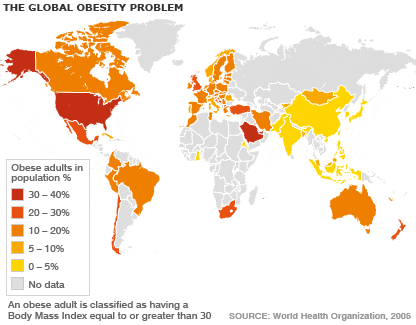Prebiotics, the non-digestible fibres which feed the body's good bacteria, could help to rectify dysbiosis; a common condition amongst overweight and obese people.
What are prebiotics?
Simply put, prebiotic fibres are a source of food that help probiotics to establish themselves, grow, multiply and survive in our intestines. In biochemical terms, they are non digestible oligosaccharides, but most particularly fructo-oligosaccharides(FOS) and inulin. These fibres remain undigested in the small intestine and pass through to the colon where they ferment and are converted into short chain fatty acids (SCFAs) by intestinal bacteria, especially by Bifidobacteria. SCFAs largely feed the cells that make up the epithelial layer of the intestines, and therefore one of their other primary physiological functions is to support the integrity of the intestinal wall.
Prebiotics impact on gut bacteria
A review published in the British Journal of Nutrition agreed with previous findings that obese and overweight individuals often have dysbiosis - that is, an imbalance in the gut of friendly bacteria and harmful bacteria (pathogens). Various studies in the past have presented this finding. Working with the assumption that dysbiosis can contribute to obesity, the researchers set out to ask if the gut microbiota can be changed in order to improve host health, and indeed weight.
The researchers, led by Nathalie M. Delzenne, found that prebiotics did have a role to play. The review suggested that the change in microbiota brought about by the prebiotics was much greater than a simple change in levels of Bifidobacteria. They added, 'Highly fermentable carbohydrates, such as prebiotics, are able to counteract several metabolic alterations linked to obesity, including hyperglycaemia, inflammation and hepatic steatosis, at least in animal models.' It was also suggested that changes in the integrity of the gut barrier could be positively influencing the host health.

This Global Obesity Map from BBC News shows that obesity is a problem in a growing amount of countries.
Another study, led by Dr Frederique Respondek at the company Tereos-Syral, using an animal model of diet-induced obesity with human type microbiota, showed that scFOS (short-chain Fructooligsaccharides) as prebiotics may influence metabolism3.
Prebiotics, such as FOS, have long been known for their ability to modulate the composition of gut flora in the intestines. Recent studies have also demonstrated that there is a significant link between gut microbiota, diet-induced obesity and associated insulin resistance. Insulin resistance occurs when cells become de-sensitised to the hormone insulin, which is responsible for stabilising blood sugar levels, causing high levels of insulin to circulate in the bloodstream (known as insulinemia), with significant health implications such as Type 2 diabetes.
This research trial, carried out by Respondek alongside two other research teams, aimed to study the effects of scFOS on a high fat diet, which is known to increase risk of obesity and negatively affect blood glucose metabolism. The study was carried out on a humanised mice model, and involved inoculating germ-free mice with samples of human faecal bacteria. As the researchers predicted, the mice fed with the high fat diet gained more weight than the control group, however those with additional scFOS in their diet experienced reduced fat deposition and higher levels of faecal Bifidobacteria and Clostridium coccoides. The Clostridium leptum faecal levels were decreased. FOS have previously been known to increase Bifidobacteria, but the interesting observation in this case was the increase in Clostridium coccoides, and reduction in Clostridium leptum. It was also noted that these changes occurred alongside some metabolic parameters, such as a reduction in levels of insulin the blood and presence of bile acids in the feaces.
Additionally, French researchers, from Institut E3M, Paris, have published a study which reveals that Akkermansia muciniphila is associated with healthier glucose metabolism, blood fats, and healthier body fat distribution4. These findings, presented in the journal Gut, also back up previous studies that have found A. muciniphila helped lower glucose levels and aid weight loss in mice. In healthy people A. muciniphila only constitutes approximately 3-5% of the gut microbiota and but it is also thought to be responsible for encouraging the growth of other beneficial bacteria through the production of fermentation products.
Prebiotics for childhood obesity
A recent study2 conducted at the University of Calgary has suggested that prebiotic fibres, which have already been found to help to moderate appetite and reduce overall food consumption in adults, may also have this effect in obese children. This is good news in the wake of recent media coverage which has indicated that parents are often unable to tell if their child is actually overweight.
The research team, led by study leader Megan Hume, monitored 39 girls and boys between the ages of seven to twelve years. The children, who were all classed as overweight or obese, were all given either 8 grams per day of prebiotic fibres in the form of 1:1 oligo-fructose: inulin or an equivalent dose of maltodextrin for a sixteen week period. The appetite of the subjects was then evaluated by their intake at a breakfast buffet at the beginning and end of the study, along with dietary questionnaires that were completed throughout the assessment period.
The results indicated that, after four months, the appetites of those children who had been given the prebiotic fibres had been reduced, and so comparably they ate less food than the other group as they felt full more quickly.
The study concluded that:
‘Long term prebiotic fibre intake may lead to reductions in energy intake that positively impact body weight. Potential causes for decreased energy intake include heightened satiety responsiveness and fullness following fiber consumption.’
Further research is needed to establish a stronger link between prebiotics and obesity.
You may also like to read other articles:
Taking Probiotics Alongside Weight Loss Medications
Could Anorexia Be Triggered by Bacteria?
References
- Natalie, M., et all, Gut microbiota and metabolic disorders: how prebiotic can work?; British Journal of Nutrition, Vol. 109, S2, Jan 2013 pp. S81 - S85.
- http://www.fasebj.org/content/29/1_Supplement/597.3.short?related-urls=yes&legid=fasebj;29/1_Supplement/597.3 M. Hume et al.(2015), ‘Prebiotic Fiber Consumption Decreases Energy Intake in Overweight and Obese Children,’ The FASEB Journal, vol. 29:no. 1 Supplement597.3
- Respondek F, Gerard P, Bossis M, Boschet L, Bruneau A et al. (2013) Short-chain Fructooligosaccharides Modulate Intestinal Microbiota and Metabolic Parameters of HUmanizes Gnotobiotic Diet Induced Obesity Mice. PLos One, 8(8):e71026
- Carlota Dao, M. et al. Akkermansia muciniphila and improved metabolic health during a dietary intervention in obesity: relationship with gut microbiome richness and ecology. Gut. Published online ahead of print.
Popular Articles
View all Weight Management articles-
Weight Management04 Apr 2025

